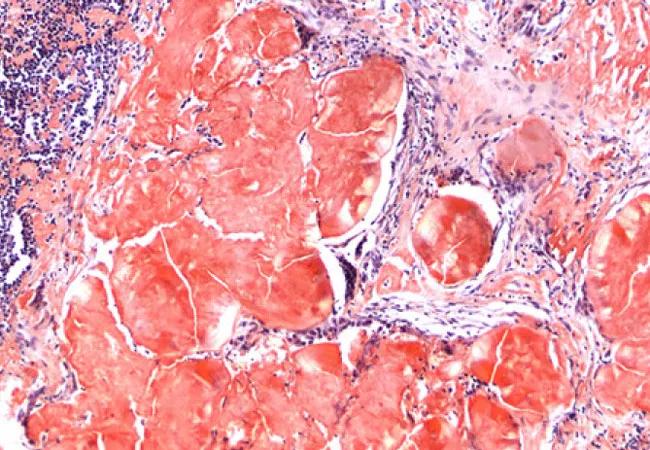Primary results from the phase 3 ANDROMEDA study

The addition of subcutaneous daratumumab to an existing combination therapy results in superior outcomes for patients with systemic light chain (AL) amyloidosis, according to a recent study. The phase 3 ANDROMEDA study compared adding subcutaneous daratumumab to the combination of cyclophosphamide, bortezomib and dexamethasone (CyBorD) with CyBorD alone.
Advertisement
Cleveland Clinic is a non-profit academic medical center. Advertising on our site helps support our mission. We do not endorse non-Cleveland Clinic products or services. Policy
“This study is the most important in a long time for AL amyloidosis patients,” says Jason Valent, MD, co-director of Cleveland Clinic Cancer Center’s Amyloidosis Center. Dr. Valent coauthored the ANDROMEDA study, which was presented at the 25th Congress of the European Hematology Association in the summer of 2020. “Clinical trials and practice-changing studies like this one are advancing the field.”
The study randomized 388 patients to receive CyBorD alone (N = 193) or with daratumumab (N = 195). The median age was 64 years. Seventy one percent and 59% had heart and kidney involvement respectively, and 65% had ≥ 2 organs involved. The primary endpoint was overall hematologic complete response (HCR) rate (intent-to-treat). Secondary endpoints included major organ deterioration progression-free survival (MOD-PFS), organ response rate, time to hematologic response, survival and safety.
At a follow up of 11.4 months, the median duration of treatment was more than four months longer in patients assigned to the daratumumab group (9.6 vs. 5.3 months), suggesting that the four-drug combination is tolerable. While 19 patients assigned to daratumumab went on to receive subsequent therapy, 79 assigned to CyBorD went on to receive more therapy.
More than a half of patients assigned to the daratumumab group achieved a HCR of 53% compared with only 18% of patients assigned to CyBorD (odds ratio, 5.1; 95% CI, 3.2-8.2; P < 0.0001). The median time to HCR was 60 days in the daratumumab group, versus 85 days for CyBorD alone. The HCR rate at six months was 50% in the daratumumab group, versus 14% in the CyBorD group. Treatment with daratumumab was associated with higher rates of overall hematologic response (92% vs. 77%).
Advertisement
Researchers also studied organ response rates. The six-month cardiac response rate was 42% for the daratumumab combination compared with 22% for CyBorD alone (P = 0.0029), and the six-month renal response rates were 54% and 27%, respectively (P< 0.0001). During the study, 56 patients died, 27 in the daratumumab and 29 in the CyBorD group.
“This study proves that this medication regimen is well-tolerated and incredibly effective,” says Dr. Valent. “We’ve seen patients respond positively in as little as two weeks, leading to a better quality of life.”
Cleveland Clinic Amyloidosis Center provides leading-edge management and treatment options for patients with amyloidosis. The center focuses on a collaborative approach with specialist practitioners from hematology/oncology, cardiology, stem cell transplantation, nephrology, neurology, palliative medicine and social work all working together to help patients navigate through their treatment course and survivorship.
“Amyloidosis often goes undiagnosed because its symptoms are common to many other conditions. It’s mistakenly considered a rare disease, when in fact, it is not. In many cases, by the time people with amyloidosis are diagnosed appropriately, they are at end stage of the disease, when not much can be done,” says Dr. Valent. “But the collaborations we’re working on now are providing better treatment options and hope for earlier diagnoses.”
Advertisement
Advertisement

Early results show strong clinical benefit rates

The shifting role of cell therapy and steroids in the relapsed/refractory setting

Radiation therapy helped shrink hand nodules and improve functionality

Standard of care is linked to better outcomes, but disease recurrence and other risk factors often drive alternative approaches

Phase 1 study demonstrates immune response in three quarters of patients with triple-negative breast cancer

Multidisciplinary teams bring pathological and clinical expertise

Genetic variants exist irrespective of family history or other contributing factors

Study shows significantly reduced risk of mortality and disease complications in patients receiving GLP-1 agonists